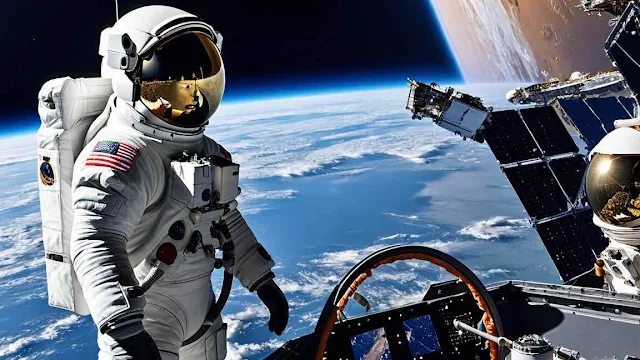In this article, we will explore how AI could autonomously control space missions, its potential benefits, the challenges it might face, and what the future could hold for AI-driven space exploration.
The Current Role of AI in Space Missions
AI is already playing a significant role in modern space missions. Space agencies like NASA, ESA, and private companies such as SpaceX use AI for various tasks, including:
- Autonomous navigation: AI helps spacecraft adjust their paths without human input.
- Data processing: AI analyzes vast amounts of data from space telescopes and rovers.
- Satellite operations: AI monitors and adjusts satellite positioning for better communication and imaging.
For example, NASA's Mars rover, Perseverance, uses AI to analyze terrain and make autonomous driving decisions. Similarly, AI systems on the ISS assist astronauts by managing experiments and monitoring the station's environment.
However, current AI technologies still have limitations, such as the need for human oversight and the inability to make complex decisions in unexpected situations.
How AI Could Control Space Missions Autonomously
In the future, AI could take full control of space missions by using advanced technologies like machine learning, deep learning, and robotics. AI could perform tasks such as:
- Autonomous navigation: Adjusting spacecraft routes based on real-time space conditions.
- Real-time data analysis: Making instant decisions based on collected information.
- Self-repair and maintenance: Detecting and fixing spacecraft issues without human assistance.
- AI-driven communication: Acting as an intermediary between Earth and space missions, managing messages efficiently.
These capabilities could allow AI to handle complex missions far beyond our solar system with minimal or no human involvement.
Potential Benefits of AI-Controlled Space Missions
If AI takes over space missions, it could bring several benefits, including:
1. Efficiency and Precision:
- AI can make faster and more accurate decisions compared to humans.
- It can analyze data quickly and optimize spacecraft operations in real time.
2. Reduced Human Risk:
- Astronauts face dangers like radiation and microgravity; AI can perform risky tasks, keeping humans safe.
3. Cost-Effectiveness:
- Automating space missions could reduce operational costs by eliminating the need for large crews and resources.
4. Exploration of Extreme Environments:
- AI can operate in harsh conditions like deep space, extreme temperatures, and high radiation without physical limitations.
Challenges and Risks of AI Autonomy in Space Missions
Despite the potential benefits, there are significant challenges and risks in allowing AI to fully control space missions.
1. Technical Challenges:
- AI systems can experience errors, software glitches, or unexpected failures that could jeopardize missions.
2. Ethical Concerns:
- Who will be responsible if AI makes a wrong decision? Moral and ethical questions arise when AI is in control.
3. Cybersecurity Threats:
- AI systems are vulnerable to hacking, which could lead to disastrous consequences if a mission is compromised.
4. Dependence on AI:
- Over-reliance on AI might reduce human expertise and adaptability in handling space mission challenges.
Key Technologies Needed for Fully Autonomous AI Missions
To achieve full autonomy, AI must rely on several advanced technologies, including:
- Artificial General Intelligence (AGI): Unlike current AI, AGI would have human-like intelligence, enabling it to make complex decisions.
- Quantum Computing: Faster and more efficient processing would allow AI to analyze vast amounts of space data instantly.
- Advanced Robotics: Robots equipped with AI could repair and build structures in space without human intervention.
- Enhanced Communication Systems: AI would need reliable communication networks to stay connected with Earth and other space stations.
Real-World Examples and Ongoing Research
Several space organizations are already working on AI-driven space technologies. Some notable examples include:
- NASA's Perseverance Rover: It uses AI to navigate the Martian surface and analyze soil samples.
- SpaceX's Starship: AI is being integrated to assist with landing and navigation procedures.
- ESA's AI projects: The European Space Agency is developing AI systems for deep space exploration and automated satellite operations.
These projects provide valuable insights into how AI could evolve to control entire missions autonomously in the future.
What Would Happen If AI Fully Controlled Space Missions?
If AI gained full control over space missions, several scenarios could unfold:
- Autonomous Interplanetary Missions: AI could explore distant planets and moons without human involvement.
- Reduced Human Space Presence: Astronauts might only be needed for critical tasks, with AI handling the majority of operations.
- Interstellar Travel: AI could manage long-duration missions to other star systems, making decisions far beyond Earth's influence.
While AI could revolutionize space exploration, it is unlikely to completely replace human involvement, as collaboration will remain essential.
The Future of AI in Space Exploration
Looking ahead, AI is expected to play a more significant role in space missions over the next decade. Key trends include:
- Improved AI algorithms for better decision-making and autonomy.
- Increased collaboration between space agencies and private companies to develop AI technologies.
- Balanced human-AI partnership, ensuring that AI complements human expertise rather than replacing it.
Governments and organizations worldwide will need to establish regulations and ethical guidelines to ensure AI’s safe and responsible use in space exploration.
Conclusion
AI has the potential to revolutionize space missions by making them more efficient, safer, and cost-effective. However, challenges such as technical limitations, ethical concerns, and cybersecurity threats must be addressed before AI can take full control of space missions.
While AI-controlled missions could extend humanity’s reach into the cosmos, a balance between AI and human involvement is essential to ensure successful and ethical space exploration.
What do you think about AI’s role in space missions? Share your thoughts in the comments below!

